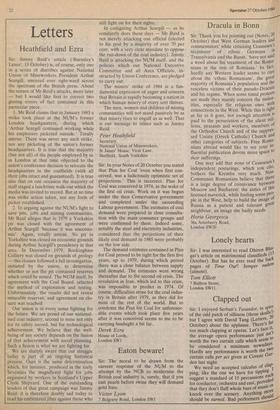Letters
Heathfield and Ezra
Sir: Jimmy Reid's article ('Barnsley's Lenin', 13 October) is, of course, only one in a series of diatribes against National Union of Mineworkers President Arthur Scargill, smeared ever right-ward across the spectrum of the British press. About the nature of Mr Reid's attacks, more later — but I would like first to correct two glaring errors of fact contained in this particular piece.
1. Mr Reid claims that in January 1983 a strike took place at the NUM's former London headquarters, during which 'Arthur Scargill continued working while his employees picketed outside.' Totally untrue. There was never any such strike, nor any picketing of the union's former headquarters. It is true that the majority (but not all) of the people employed by us in London at that time objected to the union's conference decision to relocate the headquarters in the coalfields (with all their jobs intact and guaranteed). It is true also that on one occasion the majority of staff staged a lunchtime walk-out which the media was invited to record. But at no time was strike action taken, nor any form of picket established.
2. In arguing against the NUM's fight to save pits, jobs and mining communities, Mr Reid alleges that in 1979 a Yorkshire pit was closed with the agreement of Arthur Scargill 'because it was unecono- mic'. Again, totally untrue. No pit in Yorkshire was closed on economic grounds during Arthur Scargill's presidency in that area. In December 1979, Rockingham Colliery was closed on grounds of geology — this closure followed a full investigation, initiated by the union, to determine whether or not the pit contained reserves which could be mined. The NUM itself, by agreement with the Coal Board, selected the method of exploration and testing. Unfortunately, the results did not reveal mineable reserves, and agreement on clo- sure was reached.
Our union is in every sense fighting for the future. We are proud of our national- ised coal industry, second to none not only for its safety record, but for technological acbievement. We believe that the well- being of any society depends on the fusion of that achievement with social planning. Such a fusion is what we are fighting for.
We are sharply aware that our struggle today is part of an ongoing historical process. Ours is the same determination which, for instance, produced in the early Seventies the magnificent fight for jobs organised by workers in Scotland's Upper Clyde Shipyard. One of the outstanding leaders of that great campaign was Jimmy Reid; it is therefore doubly sad today to read his embittered jibes against those who still fight on for their rights.
In castigating Arthur Scargill — as he constantly does these days — Mr Reid is not merely attacking one official (elected to his post by a majority of over 70 per cent, with a very clear mandate to oppose the run-down of the coal industry). Jimmy Reid is attacking the NUM itself, and the policies which our National Executive Committee and all Area Officials, in- structed by Union Conference, are pledged to carry out.
The miners' strike of 1984 is a fun- damental expression of anger and concern that Britain is rapidly becoming a nation in which human misery of every sort thrives.
The men, women and children of mining communities will not stand passively by as that misery rises to engulf us as well. That is our message to critics such as Jimmy Reid.
Peter Heathfield
Secretary, National Union of Mineworkers, St James' House, Vicar Lane, Sheffield, South Yorkshire


















































 Previous page
Previous page